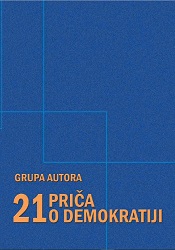Odnos nacionalnog i demokratskog kroz iskustvo jugoslovenskih naroda
The relation of national and democratic through the experience of Yugoslav people
Author(s): Šerbo Rastoder
Subject(s): Political Theory, Political history, Social history, Recent History (1900 till today), Politics and society, Nationalism Studies
Published by: Centar za građansko obrazovanje (CGO)
Keywords: democracy; Yugoslavs; national and democratic; relation;
Summary/Abstract: Yugoslav state has been created in 1918 from the idea of ethnical congeniality of three nations (Serbs, Croats and Slovenians), an ideological rhetoric regarding one nation with three names, formal principle of self-determination and an ambition to have a modern state with democratic presage. While in the basis of the ideological rhetoric during its emerging one can recognize all attributes of the process of modern shaping of state creations (nation, self-determination, democracy), in its historical endurance the attributes contrary to above-mentioned fundamental principals have been observed- through dominant conflict of national and democratic, as imaginary collectivism and institutional form of governance in whose centre is an individual and his fundamental rights. From its creation, first Yugoslavia has been faced with the problem of integrative factor. Each ideological attempt to integrate its constituting nations on the principle of „Yugoslavian„ supreme-nation has been seen as national hegemony of the biggest nation. Culture could not emerge as integrative factor since for centuries it has been formed on different basis, on circumference of three different religions. It neither could have been ideology, which has in political sense been reduced to national rhetoric (essentially autistic), and especially not democracy, since the democracy itself excluded the sense of existence of the state. Because of all of those reasons, Yugoslav state could not survive democracy, since the democracy has not been the cornerstone of its creation, or the mark of its historical endurance, thus being the limit of its survival. As for the second Yugoslavia, it has been relatively successfully developing while two pillars of its unity existed- communistic Party of Yugoslavia and Tito, which after those integrative factors disappeared, immediately conditioned its dissolution, because in context of nonexistence of democratic tradition, the freedom of national speech was seen as democratic step forward in relation to the previous period. With the conclusion that only creations which have a democratic heritage can count on stable and prosperous development, it would be interesting to consider the tradition and practice of Montenegro in this scope first of all from the aspect of national and democratic. Multicultural society is in Montenegro one of the most favorite declarative platitudes, and by using it one wants to proclaim certain goals, corresponding to modern trends, and is neglecting the essence of the problem that this kind of society is not created, but that it is a product of concrete reality. As on Balkans the cultural identity is developed on destroying the identity of others, thus dialectical conflict between constant fight and civilization coexistence has constantly conditioned the perception of diversity of cultures and nations as more being a handicap than an advantage. Therefore, the fact that different civilization heritage exists in a society does not make it automatically a multicultural one. That society is a reality, and multiculturalism is a form of cultural politics, or striving to have equal coexistence of cultures. Montenegrin society is still in declarative stage, when regarding cultural politics. And also by this – is potentially a multicultural society. It will stay like this until clear consensus is reached, among political and cultural elites, regarding the social values of multicultural society, as a precondition for social favorable atmosphere for development of democracy and internal harmony.
Book: 21 priča o demokratiji
- Page Range: 75-84
- Page Count: 10
- Publication Year: 2005
- Language: Montenegrine
- Content File-PDF

